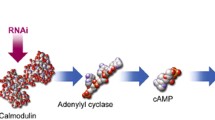Abstract
Paramecium generates persistent shifts of the membrane potential of a few millivolts depending on its orientation with respect to the gravity vector. The resulting potential-induced modulation of the speed of propulsion is called gravikinesis because it acts to neutralize, fully or in part, sedimentation. Gravisensitivity is maximal at neutral orientation, i.e., in horizontally swimming cells, when the gravitational force per unit membrane area is at minimum. Stimulus-response relationships and energetic considerations show that sensing of the gravity vector by a nonspecialized, single-cell organism ranks among the most sensitive mechanoreceptors known in nature.
Similar content being viewed by others
Author information
Authors and Affiliations
Additional information
Received: 15 December 1998 / Accepted: 18 February 1999
Rights and permissions
About this article
Cite this article
Gebauer, M., Watzke, D. & Machemer, H. The Gravikinetic Response of Paramecium is Based on Orientation-Dependent Mechanotransduction. Naturwissenschaften 86, 352–356 (1999). https://doi.org/10.1007/s001140050634
Issue Date:
DOI: https://doi.org/10.1007/s001140050634




